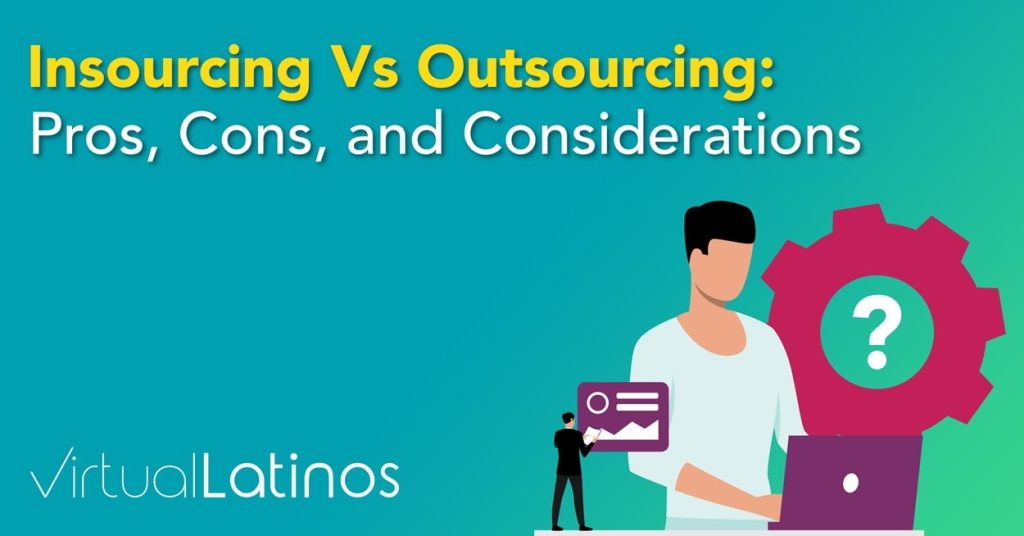When considering insourcing vs outsourcing, businesses face a critical decision that impacts their operational efficiency, cost structure, and overall success. This choice between utilizing internal resources for tasks and projects or enlisting external expertise is more than just a strategic move; it defines how a company navigates its growth, innovation, and market positioning.
This article delves into the nuances of insourcing and outsourcing, exploring the advantages and challenges of each approach to help business leaders make informed decisions. With the landscape of work evolving rapidly, understanding the key factors that influence this decision is crucial for staying competitive and achieving long-term goals.
Content
ToggleWhat are the key differences between insourcing and outsourcing?
| Aspect | Insourcing | Outsourcing |
|---|---|---|
| Control | Higher control over processes and decision-making. | Less direct control, depending on the outsourcing partner’s policies. |
| Cost | Potentially higher upfront costs due to training and infrastructure. | Can reduce operational costs by leveraging specialized services and economies of scale. |
| Expertise | Limited to in-house skills and requires training for new competencies. | Access to a wide range of expertise and specialized skills from external providers. |
| Flexibility | Adapting to changes can be slower due to internal processes and policies. | Greater flexibility to scale operations up or down as needed. |
| Risk Management | Assumes full responsibility for risks associated with the insourced activities. | Risks can be shared or transferred to the outsourcing partner, depending on the agreement. |
| Focus on Core Activities | May divert focus from core competencies to manage diverse functions internally. | Enables companies to concentrate on core business areas by offloading non-core tasks. |
| Cultural Alignment | Easier to maintain alignment with company culture and values. | Requires effort to ensure the outsourcing partner aligns with company culture and values. |
What is insourcing?
Insourcing is the practice of assigning tasks or projects to individuals or teams within your own company instead of hiring external entities. It involves leveraging existing employees’ skills and resources in house team to complete specific operations or projects.
This approach allows for greater control over a defined business process, fosters a deeper understanding of the company’s challenges and objectives, and can enhance in house team cohesion by keeping all work under one roof. Insourcing can be particularly beneficial for tasks that require a high degree of oversight, confidentiality, or alignment with the company’s culture and values.
Why insourcing?
Choosing insourcing comes with several strategic advantages for businesses. First, it offers greater control over projects and processes, allowing for more immediate oversight and adjustments as needed.
This approach fosters internal employees cohesion and ensures that the work aligns closely with the company’s goals and culture. Insourcing also leverages existing employee skills, potentially uncovering untapped talents within the organization, which can lead to innovative solutions and personal development opportunities for staff.
Additionally, keeping tasks in-house can enhance confidentiality and data security, particularly for sensitive projects. It can also reduce dependency on external entities outsourcing partners, making operations more resilient to external market fluctuations and uncertainties.
Ultimately, insourcing can strengthen organizational identity and commitment, as employees directly contribute to and witness the impact of their work on the company’s success.
What is outsourcing?
Outsourcing is the practice of hiring external organizations or individuals to handle certain tasks, processes, or services that could be performed internally. Businesses often outsource to cut costs, access specialized skills, and improve efficiency.
This strategy allows companies to focus on their core competencies by outsourcing non core functions to third party vendors. Outsourcing work can range from software development, customer service and marketing support to manufacturing and administrative tasks, providing flexibility and enabling companies to adapt quickly to market changes and demands.
Why outsourcing?
Outsourcing is chosen for several compelling reasons. It allows businesses to reduce costs, especially for labor and operational expenses, by tapping into economies of scale and lower cost structures available in other regions. Outsourcing business operations also grants access to specialized expertise and advanced technologies without the need for significant investment in training or equipment related to hiring permanent employees.
This approach enables companies to focus on earning a competitive edge by devoting more resources and attention to business objectives. Additionally, outsourcing offers flexibility and scalability, making it easier to adjust to market demands and business cycles without the complexities of hiring new employees or dealing with layoffs.
By leveraging the skills and infrastructure of an external service provider, companies can improve service quality, accelerate time-to-market for products or services, lower labor costs and ultimately enhance customer satisfaction.
What are the benefits of insourcing?
Insourcing offers several benefits that can be advantageous for your business:
Control and Expertise
By insourcing tasks or projects, you maintain control over the decision-making process and have direct oversight of the operational infrastructure. Your internal teams possess a deep understanding of your brand messaging, vision, and internal business processes already, allowing them to execute tasks with a high level of expertise.
Cost Optimization
In some cases, insourcing can be more cost-effective than outsourcing. By insourcing and utilizing your existing resources, you eliminate the need to hire external human resources, saving on recruitment and employee training costs. Additionally, in-house operations can be more efficient as employees are familiar with the company’s systems and processes.
Communication and Collaboration
Insourcing provides several key advantages in terms of communication and collaboration within your organization. Since all operations are conducted internally, there are no communication barriers or delays that may arise when working with external entities. This characteristic facilitates a smoother workflow for internal employees and allows for quick decision-making.
What are the drawbacks of insourcing?
While insourcing offers several benefits, it also has its limitations and potential drawbacks:
Limited Resources and Expertise
Insourcing may only be feasible if your organization has the resources or expertise to handle specific tasks or projects. In such cases, you may need to invest in additional training or hire new talent, which can increase costs and potentially delay project timelines.
Reduced Flexibility
Insourcing can sometimes limit your organization’s flexibility significantly when scaling operations or adapting to changing market demands. Internal resources may have limitations in capacity and expertise, making it challenging to respond to market fluctuations or undertake new initiatives quickly.
Opportunity Cost
By focusing on insourcing, you may take advantage of opportunities to leverage external expertise or specialized services. Outsourcing specific tasks or projects could free up valuable time and resources, allowing your organization to concentrate on core competencies and strategic initiatives.
What are the benefits of outsourcing?
Outsourcing provides several advantages that can significantly benefit your business:
Access to Specialized Skills and Expertise
One of the primary advantages of outsourcing is the ability to tap into a global talent pool of specialized skills and expertise. By partnering with external team members of agencies or freelancers, you can leverage their knowledge and experience in specific areas, such as marketing strategies, IT, or customer support.
Cost Savings
Outsourcing can often be more cost-effective than maintaining in-house operations. External providers typically offer competitive pricing models that allow you to access top talent and services at a fraction of the cost of hiring full-time employees. This aspect can result in significant cost savings for your organization.
Scalability and Flexibility
Outsourcing provides scalability and flexibility, enabling your organization to adapt to changing business needs. You can quickly scale up or down your outsourced services based on demand without investing additional resources or infrastructure.
Focus on Core Competencies
By outsourcing non-core activities, your organization can focus on its core competencies and strategic initiatives. This benefit helps improve overall efficiency and productivity, as your internal teams can devote more control their time and energy to tasks that directly contribute to your business goals.
What are the drawbacks of outsourcing?
While outsourcing offers numerous advantages, it’s essential to consider the potential drawbacks:
Quality Control and Communication Challenges
When outsourcing tasks or projects, maintaining quality control can be a challenge. You rely on external entities to deliver work that meets your standards and requirements. Communication barriers, such as language differences or time zone variations, can also impact the effectiveness of collaboration and project management.
Data Security and Privacy Concerns
Outsourcing may involve sharing sensitive business information with the outsourcing firm. This instance raises concerns about data security and privacy. It’s crucial to carefully evaluate the reputation and security measures of the outsourced team to mitigate the risks associated with data breaches, intellectual property theft, or leaks of sensitive information.
Dependency on External Providers
When you outsource critical functions of your core business functions, you become dependent on the performance and reliability of external providers. If an outsourced provider fails to deliver, it can significantly impact your own organization operations and reputation. It’s essential to establish clear communication channels, set expectations, and regularly monitor the performance of outsourced partners.
How to Decide: Outsourcing vs Insourcing?
When it comes to deciding between insourcing and outsourcing, there are several factors to consider:
Nature of the Task or Project
Evaluate the specific requirements of the task or project at hand. Determine whether it requires customized solutions, skills or expertise that are not readily available within your organization. If the task or project falls outside your core competencies, outsourcing may be a more viable option.
Cost Considerations
Assess the financial implications of both insourcing and using outsourcing services. Compare the costs of hiring new talent, training employees, or creating new departments for insourcing against the pricing models offered by outsourcing providers. Consider long-term potential cost savings and the potential return on investment.
Control and Flexibility
Consider the level of control and flexibility you require over the task or project. Insourcing provides greater control over decision-making and operations, while outsourcing allows for scalability and flexibility. Determine which aspect is more critical to the success of the task or project.
Risk Tolerance and Security
Evaluate your organization’s risk tolerance and the risks associated with outsourcing. Consider the sensitivity of the task or project, the potential impact of data breaches or leaks, and your organization’s security requirements. If data security is a paramount concern, insourcing may be a safer option.
Time Constraints and Expertise
Assess the time constraints and expertise required for the task or project. An external provider often provides faster turnaround times and access to specialized expertise, while insourcing may require additional training or hiring processes. Consider the urgency of the task and the level of expertise needed for successful completion.
Final thoughts on insourcing vs outsourcing for your business
In the debate between insourcing and outsourcing, there is no one-size-fits-all solution. Each approach has its advantages and drawbacks, and the decision ultimately depends on your organization’s specific needs, resources, and goals.
Insourcing offers control, expertise, and cost savings, but it may limit flexibility and require additional investments. Outsourcing provides access to specialized skills, cost savings, scalability cost efficiency, and flexibility, but it may pose challenges regarding quality control and data security.
By carefully evaluating the nature of the task, cost considerations, control and flexibility requirements, risk tolerance, and time constraints, you can make an informed decision that aligns with your organization’s goals and strategic objectives.
Remember, whether you choose to insource or outsource, it’s crucial to establish clear communication channels, set expectations, and regularly monitor performance to ensure successful outcomes. If you opt for an outsourcing company, consider partnering with Virtual Latinos, a reliable agency that can connect you with top-talented virtual assistants from Latin America.
FAQ: Insourcing vs Outsourcing Decisions for Business Strategy
What is the main difference between insourcing and outsourcing?
Insourcing vs outsourcing refers to the strategic decision of a business to either perform tasks and operations internally (insourcing) or delegate them to an external supplier (outsourcing). The choice impacts everything from operational efficiency to company culture.
How can global outsourcing benefit my business compared to insourcing?
Global outsourcing offers access to a worldwide talent pool, potentially reducing costs and improving service quality through specialization. Unlike insourcing, which relies on the internal team’s capabilities, outsourcing can provide more flexibility and access to innovations not present within the company.
What are the key advantages of strategic outsourcing over insourcing?
Strategic outsourcing allows businesses to focus on their core competencies by handing non-core activities to experts outside the company. This contrasts with insourcing, where the internal team may spend significant resources on tasks that do not directly contribute to the company’s primary value proposition.
Why might outsourcing to Latin America be preferred over insourcing?
Outsourcing to Latin America can offer cost savings, skilled labor, and time zone advantages conducive to real-time collaboration. This region provides a viable alternative to insourcing, especially when a company seeks to blend nearshoring benefits with cultural affinity and language alignment.
How does nearshoring differ from other outsourcing strategies, and why choose it over insourcing?
Nearshoring, a subset of outsourcing, involves contracting work to countries close to the business’s home country, offering geographical, time zone, and cultural advantages. It stands as a compelling alternative to insourcing by offering external supplier efficiency with fewer logistical challenges than global outsourcing.
In what ways does virtual assistant outsourcing compare with insourcing administrative tasks?
Virtual assistant outsourcing can significantly reduce costs and provide scalable support for administrative tasks, unlike insourcing, which might involve hiring full-time staff regardless of fluctuating workloads. Outsourcing ensures that the company pays only for the work needed, aligning external resources with demand.
How can sales outsourcing enhance my business strategy compared to building an internal sales team?
Sales outsourcing allows businesses to leverage specialized expertise and innovative sales techniques immediately, without the time and expense of developing an internal team. This approach can quickly adapt to market changes and drive growth more effectively than insourcing sales functions, where building and maintaining a skilled team can be costly and time-consuming.
What considerations should I make when deciding between insourcing and outsourcing for my business?
When weighing insourcing and outsourcing, consider factors like cost, control, expertise, and scalability. Assess whether your internal team can effectively handle the task at hand or if an outsourcing company can offer better efficiency, innovation, or cost savings.
How does company culture influence the decision between insourcing and outsourcing?
Company culture plays a critical role in the insourcing vs outsourcing debate. Insourcing can strengthen company culture by keeping all operations in-house, fostering a sense of unity and shared purpose. In contrast, outsourcing might introduce challenges in aligning external teams with the company’s values and work ethic, although it can also bring fresh perspectives and diversity.
What are some common misconceptions about outsourcing compared to insourcing?
A common misconception is that outsourcing always leads to lower quality compared to insourcing. However, choosing the right outsourcing partner can actually enhance quality through specialized expertise. Another is that outsourcing necessarily diminishes control over operations, but with clear communication and effective management, businesses can maintain robust oversight of outsourced functions.
Virtual Latinos – Your Reliable Outsourcing Partner
When considering outsourcing options, Virtual Latinos is a reliable virtual assistant recruiting agency that can provide US businesses and entrepreneurs with top talented bilingual professionals from Latin America.
With Virtual Latinos, you can access a diverse pool of skilled virtual assistants who can assist you with various tasks, including administrative support, social media management, graphic design, and more. Outsourcing to Virtual Latinos allows you to benefit from cost savings, access specialized expertise, and enhance operational efficiency.
Learn more about Outsourcing Strategies:







